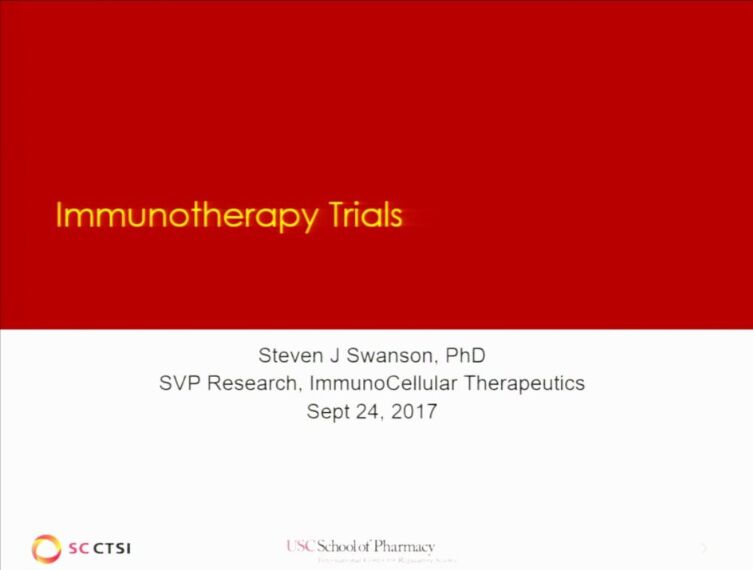Immunotherapy is treatment to stimulate or restore the ability of the immune system to fight infection and disease
Immunotherapy for Cancer:
- Surgery may not remove every cancer cell
- Chemotherapy and radiation therapy kill indiscriminately
- Cancer can recur after apparently successful treatment
Autologous vs Allogeneic:
- From patient vs from donor
- HLA type - risk of rejection or GVHD
- Immunosuppressive therapy
Immunotherapies Being Investigated:
- Biological response modifiers
- Tumor infiltrating lymphocytes (TILS)
- mAb Therapy
- T cell therapy
- Dendritic cell therapy
- Viral therapy
- Chimeric antigen receptor (CAR-T) T cell therapy
- Checkpoint inhibitors
Trial Considerations for Immunotherapy:
- Biological Response Modifiers
- Large scale manufacturing
- Readily support large trials
- Cross-reactivity to endogenous protein the drug mimics
- Monoclonal Antibodies
- Specificity in binding
- Various oncology purposes
- Concern for loss of efficacy
- Tumor Infiltrating Lymphocytes
- Isolation and growing of T cells
- Personalized therapy
- Trial size will be smaller than traditional products
- The matching of HLA between donor and recipient
- Concern for TILs targeting antigen expressed on health tissue
- T cell therapy
- Individualized autologous therapy
- DC Immunotherapies
- ICT-107
- DC cells are highly potent antigen presenting cells
- DC therapy involve isolation of PBMCs, driving DC formation, activating and exposing DCs to tumor antigen(s), re-introducing them to the patient
- Fragile autologous cell-based therapy
- Single patient manufacturing
- Extremely high cost for large trials
- Viral-based Immunotherapies
- Oncolytic viruses
- Not an autologous product
- Manufacturing is not individualized
- Patient and healthcare workers administering the drug cannot be immunocompromised
- Drug must be stored and shipped at -80°C to maintain viability
- CAR-T Immunotherapies
- Clone a chimeric antigen receptor into T cells
- Allows CAR-T cells to recognized, bind and kill tumor cells
- Single patient manufacturing
- Slow dose escalation necessary due to toxicity potential (cytokine release syndrome)
- Checkpoint Inhibitors:
- mAbs that are designed to bind and interrupt action of immune system regulators
- Allows the immune system to rest
- PD-2; PD-L1; CTLA-4
- Traditional biotech products allowing large scale manufacturing
- Readily support large trials
- Often used in combination with another type of therapy

